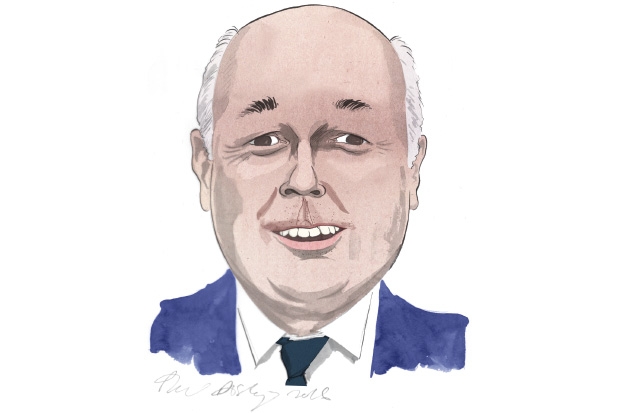Iain Duncan Smith may have lost his job, but he has found a new whisky. It’s called Monkey Shoulder, and they became acquainted when he went to  lie low in the Highlands after his resignation. When he went to buy a new bottle from Robertsons of Pitlochry he was told he’d have to wait a few days.
lie low in the Highlands after his resignation. When he went to buy a new bottle from Robertsons of Pitlochry he was told he’d have to wait a few days.
‘I told them not to worry, that I had more time on my hands. The man behind me said: “Yes, we know all about that — you were the talk of the town here for days.”’ It’s an example, he says, of how his resignation struck a far deeper chord than he imagined it would.
‘It has been very odd,’ he says. ‘There’s a huge number of letters and emails piling in, saying “thank you”. Scot Nats, Labour people — not chain letters, handwritten ones. It’s been a bit surprising.’ He says he never sought to pose as an anti-cuts martyr — which would, anyway, be unconvincing from the bedroom-tax author who cut welfare more than any of his predecessors. But Duncan Smith chose to resign with such drama — at 9 p.m. on a Friday with a spirited ‘J’accuse’ against the government — in order to warn his party that it is heading in the wrong direction. That it is in danger of being hollowed out, and losing sight of the people to whom it ought to be dedicated.
This week, Duncan Smith has been in Washington to address Republicans interested in what George W. Bush called ‘compassionate Conservatism’. Many names have been attached to the basic idea, articulated by Irving Kristol and Milton Friedman, that government welfare schemes tend to entrench poverty, rather than alleviate it. As Duncan Smith put it in his speech to the American Enterprise Institute, Conservatives ought to abhor the ‘feed-and-forget compassion’ of the left, and judge welfare by the extent to which it saves lives, not just money. They should build ‘a welfare system that encourages rather than replaces work and the family’.
Sitting in the Spectator office (he doesn’t have one of his own any more) he says the Tories ought to see this as an issue of political survival. ‘The left are told by voters: yes, you may be incompetent but your heart’s in the right place,’ he says. ‘Conservatives get the opposite: yes, you may be competent but we question your motives. When -voters mark the ballot paper, they ask: are they good for me? That’s the competence issue. But they also ask: are they good for my neighbour? If we have both boxes ticked, we get elected. But if we fail the good-for-my-neighbour test, we don’t.’
This is precisely where he thinks David Cameron’s government is now going wrong. ‘Winning the last election made us become casual about this,’ he says. Tories can never assume they are seen as well-intentioned reformers, rather than ice-hearted hatchet men. ‘It takes five minutes to lose this narrative, and a lifetime to get it back. This has been my concern over the past nine months; I’ve been worried that our reputation was being slowly chipped away and that we’d be left with the narrow message of caring only for finances. And being seen as favouring only those we regard as the wealth creators.’
His resignation was triggered by George Osborne’s last Budget, which announced disability benefit cuts alongside tax cuts for the better-paid. Duncan Smith supports each of these measures individually, but had argued — in private and in vain — that to juxtapose them would be politically toxic. He made the same case when trying to prevent the (now rescinded) tax-credit cuts. He felt he was losing his ability to influence not so much the government, but a Cameron-Osborne duumvirate that had stopped caring what he, or other cabinet members, thought. He even became nostalgic for the days of the coalition, thinking that at least ministers were listened to then.
Although he was not listened to — or even notified — when Osborne declared two years ago that he’d shave another £12 billion from welfare in the first two years of a second term. The Chancellor was impressed by polling showing the widespread popularity of the welfare cap, and saw deeper cuts as a way of drawing a dividing line between the Tories and the Labour party. Duncan Smith thought he’d already cut welfare to the bone. The extra £12 billion was ‘announced arbitrarily’, he says, without his being consulted. ‘There was a little bit of a debate, to put it politely. A massive cut to working-age benefits had been announced before an election, with no work done to see where the cuts were going to be found.’
So the situation was every bit as -chaotic as Ed Miliband claimed at the time: a £12 billion pledge — a figure plucked from the air — without discussion, and with no thought as to how many people would be affected. As the election campaign drew near, Cameron further narrowed the options: pensioners would be protected, winter fuel payments would not be touched. Anything that affected pensioners (the group most likely to vote) was exempt from austerity. Duncan Smith says he considered resigning after the election. ‘The reason I decided to stay was that I felt I had to somehow ameliorate this process.’ He negotiated down the cuts, and extended the two-year deadline. But in doing so, he shortened his own life expectancy in government.
By then, he had become concerned about the ‘triple lock’ — the Tory pledge that the state pension would rise with inflation, earnings or by 2.5 per cent, whichever was the highest. He came to see this as generational discrimination, and argued for more balance. ‘I have believed that for some time,’ he says. ‘Don’t get me wrong, I think the overall pension position had been allowed to fall.’ But it started to recover, quickly. ‘I’m not against the growth but it comes with a whole patchwork of other benefits, like winter fuel and bus passes.’ And, he says, ‘There is a whole number of wealthier pensioners engaged now in this process.’
Today, thanks to booming house prices, one in six pensioners lives in a millionaire household — each one receiving the -winter fuel payment and the triple-lock pension protection. Does he consider these pledges unaffordable? ‘I think you can do the maths,’ he says. ‘It is ratcheting up at a rate of knots. I’m for a much better state pension but I think there’s a balance to be struck in all these things.’ Reneging on a manifesto promise on pensions, he says, is not an option for the Prime Minister. ‘But I do think there are grounds for us to look again at the balance of this.’
His resignation had been seen by some as an act not of principle but of sabotage, aimed at destabilising David Cameron at a time when he was leading the campaign to stay in the European Union. Ros Altmann, who worked under him as pensions minister, said his dramatic departure had ‘everything to do with Brexit’. But Duncan Smith declares himself a recent convert to the cause.
‘I never was for “out”, believe it or not. I actually thought it was possible to get a proper reform deal with the European Union and a semi-detached relationship,’ he says. ‘Ultimately, that’s where we’ll end up. Vote Leave is about a completely new relationship with the European Union. It means we don’t go round squealing and getting angry with them; they don’t get fed up with us — and we have a really good, balanced relationship. One they’ll be happy with. They can integrate as much as they like, even pursue single-state status — we won’t be joining them.
But won’t this referendum, like most referendums, end in a victory for the status quo? ‘It depends what you think the status quo is,’ he says. ‘In my view, the status quo is to leave. That gives the greatest sense of balance and fairness. To remain is the exact opposite: to remain is to leap in the dark.’ But he doesn’t seem terribly interested in all of this. Ask him about Europe, and he stops talking after a sentence or two. Ask him about welfare and he never shuts up: about schemes he started to train lorry drivers, about his Universal Credit programme, about a man who wrote to tell him that he’d not only found work, but found a wife at work.
Even Tory MPs, he says, have been writing to him. ‘I’ve had a lot of letters saying: your agenda is what I believe in, it’s what I campaigned on. A lot of the new MPs, particularly, have written. I thought there’d be a bit of frostiness, but not at all. I’ve just had lots of people saying, “We must stick with this agenda.” Lots of them are very committed to this.’ Including, he says, his successor Stephen Crabb. ‘Although I’ve not had a massive chance to discuss it with him.’
Duncan Smith has not spoken to any newspapers since resigning, explaining that he has made his point — and is even back on speaking terms with the Chancellor. ‘We bumped into each other in the lobby the other day; all very reasonable. We chatted a little bit. The funny thing is, this isn’t personal with me. Nothing in politics is personal.’ A fine theory. With enough whisky, he might even come to believe it.






Comments